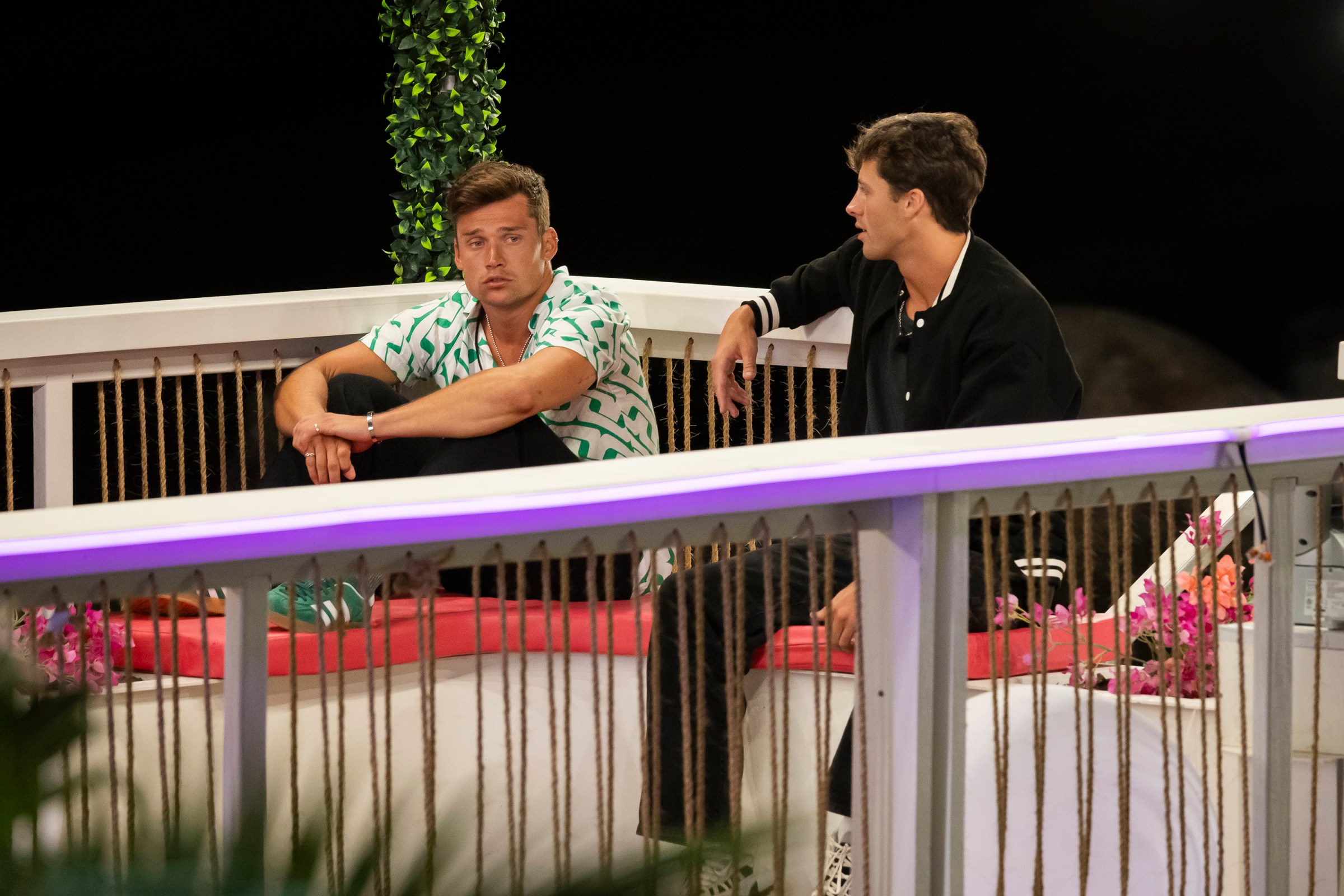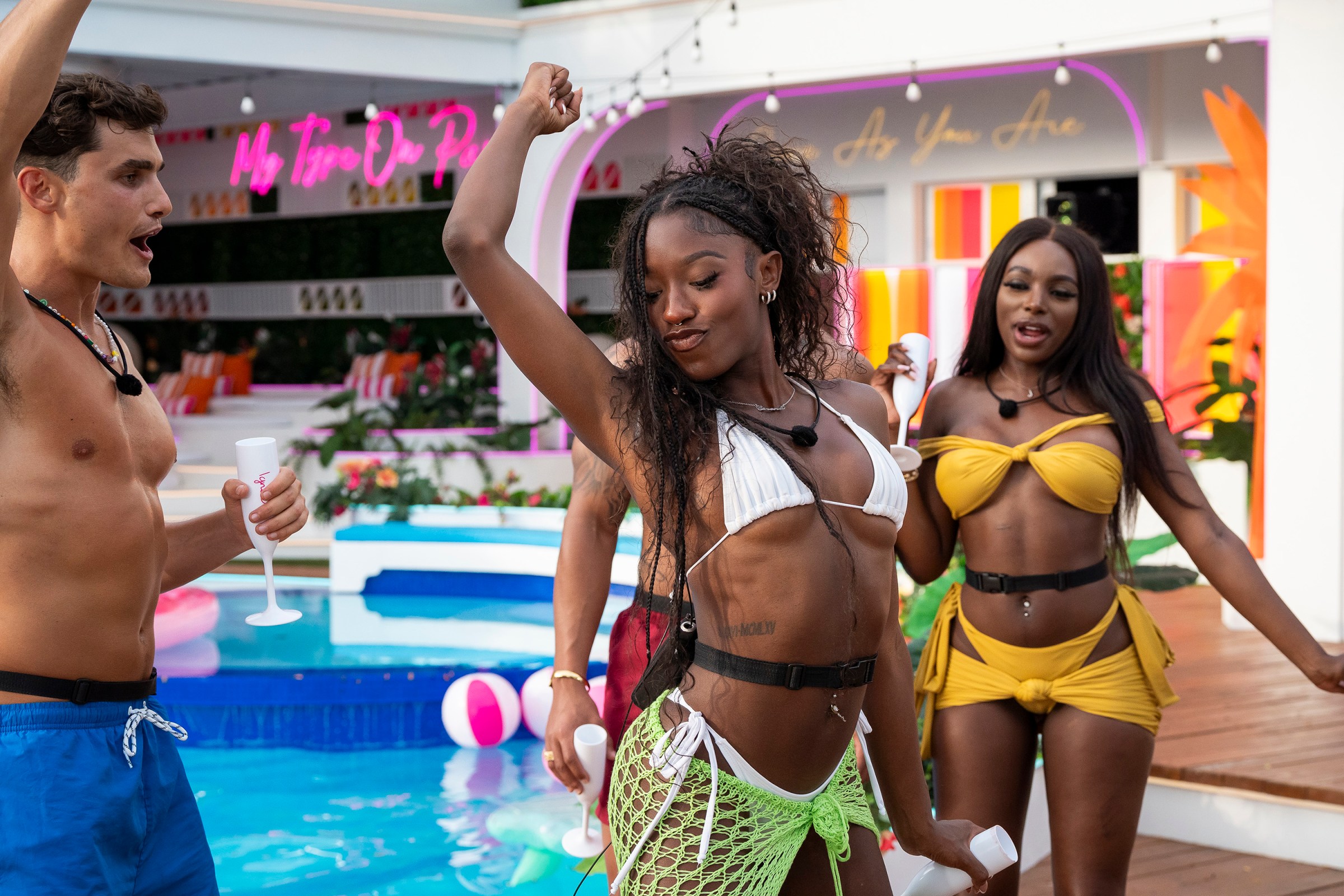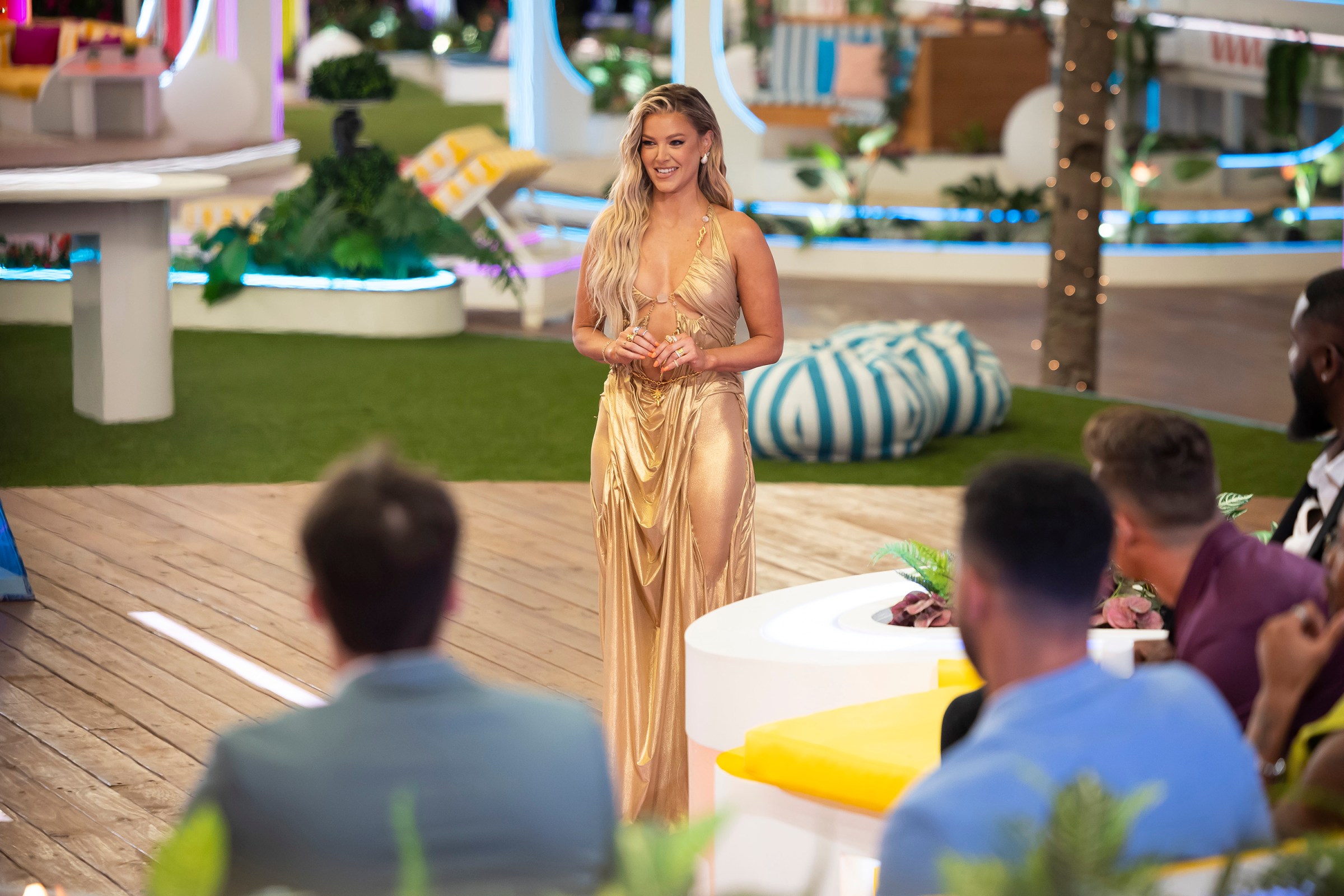There’s a beautiful encounter in episode two of the current season of Love Island USA, where contestant Kordell, pressed repeatedly by his partner Serena to open up about his long-term goals, says that he one day aspires to do sponsorships for Cheez-Its. It is at this precise moment that I finally start to believe the whispers I’ve heard online and from fellow fans: that for once, the American version of Love Island is more entertaining than its British counterpart.
Love Island is a dating game show in which sexy singles in tiny swimsuits are marooned in a villa in Mallorca and must compete to couple up with each other or risk getting “dumped.” The show has been synonymous with summertime in UK tabloids and water cooler conversations since it first aired in 2015. Six nights per week from June to August, viewers tune in to watch the couples fight and flirt, periodically voting on their favorite contestants. At the grand finale, the most voted-for couple wins a £50,000 prize.
The American version, now in its sixth season, follows pretty much the same formula (instead of Mallorca, it takes place in Fiji, and the prize is $100,000), though it historically never quite managed to capture the magic and messiness of the original, where contestants in a rainbow of distinct British and Irish accents befriend, betray, and literally bone each other on camera.
Aaron and Rob, this season’s bromance.NBC Universal
But despite middling reviews in previous years, season 6 of Love Island USA has finally cracked the code. The show is currently the No. 1 reality series in the US across all streaming platforms, according to Nielsen, and Peacock’s most-watched series by far, gaining twice as many views as last year.
Luminate, an entertainment data tracking company, reports that Love Island USA was the most-watched streaming original series in the US during the second week of July, with 919 million minutes watched, a 257 percent increase from the week it debuted (in a fairly distant second place was The Bear, at 630 million minutes). To be clear, much of this is due to the sheer number of hours available to stream (this season will have around 35 episodes, and previous UK seasons have had nearly 50), but in order to consume 35 hours of television, you’ve got to be pretty invested.
Simon Thomas, the show’s executive producer, points to the charismatic cast as the main reason for this season’s success. “They’re the most ridiculously good-looking group that we’ve probably ever had, and they’re all vulnerable and fun and friendly, like we always want,” tells me. “But there was something about them that you almost couldn’t put your finger on. It’s magic and we’re making a potion, and maybe you get it right.” It’s an alchemy that few reality shows are able to replicate in an era in which many have lost their shock and voyeurism value: With every brilliant Real Housewives cast or compelling Bachelor lead are a million more that end up forgotten in the streaming wasteland.
Serena and JaNa are two fan favorites.NBC Universal
Early seasons of Love Island USA may have struggled in part due to the prudishness of both American values and its laws: Federal broadcasting regulations ban the airing of certain sex acts and swear words on TV, while British reality shows have long featured un-bleeped curses and full-frontal nudity (I’m begging anyone who has not yet had the pleasure to go watch the UK’s Naked Attraction, which the American mind could simply not comprehend).
It is also due to the cultural differences of the Islanders: In 2019, one producer told the New Yorker that “the American contestants were uniformly chaste and polite, their speech sanitized psychobabble cultivated to convey self-awareness, depth, and respect for women.” In contrast, UK Islanders have usually been much more forthcoming about the sex they’re having with each other, openly calling each other “slags,” and frequently discussing whether or not the men are giving them “fanny flutters,” which an American woman might translate to “vagina dance.”
The Ringer explained at the series’ outset that it could never live up to the original because of Americans’ unwillingness to laugh at themselves. American tastes also tend toward self-serious dating shows like The Bachelor, with its demand that contestants be “here for the right reasons,” i.e. to find love, not fame. Love Island turns the American inclination toward piety and earnestness on its head, acknowledging that, in fact, absolutely nobody is here for the right reasons.
Absolutely nobody is here for the right reasons
Among other things, this season finally replicates the fun of showcasing a buffet of regional accents: Pittsburgher Kaylor doesn’t pronounce her L’s, so words like “told” and “single” sound like “toed” and “singoh.” Professional snake wrangler and overall wearer Rob’s Alabama twang would come out stronger if he ever sat up fully or spoke louder than a grunt. And Calabasas-based Leah speaks with such a slow SoCal drawl that she sounds like she’s been shot with a poisoned dart.
They’ve also sprinkled in a few foreigners, like Liv, an Aussie, Miguel from London, and, most notably, southern England’s Aaron, who has the energy of a rabbit on Red Bull, is best known for having a, er, prominentarc on series two of The Traitors UK, and inexplicably, as the internet has noted, has the mouth of an American Girl doll. Hilariously, the American Islanders have even started using some of the British slang introduced to the US from the original Love Island: This season, you’ll have the rather uncanny experience of hearing Americans use phrases like “mugged off,” “fit,” “turning heads,” “fanny flutters,” and referring to grilled cheese as “toasties.”
And then there’s the draw of its new host, Vanderpump Rules’ Ariana Madix, who shot to mainstream fame last year after her partner of a decade was caught having an affair with another Vanderpump cast mate, creating the maelstrom that would forever be known as Scandoval. “Normally the saying in TV is ‘followers don’t follow.’ It’s not enough to book someone who’s got 10 million followers,” Thomas explains. “But Ariana, they would follow her to the moon and back. People care about her in a way I’ve never seen. Her personal story mixes really well with the show.”
Host Ariana Madix chats with the Islanders.NBC Universal
While this season hasn’t featured many of the genuine love stories that spark sporadically on the island, it has been just as fun to watch friendships form, like the bromance between Rob and Aaron and the sisterhood among the women. Black women, who’ve long been sidelined on Love Island, also take a starring role this season in the form of the loveable, princessy JaNa and the spunky Serena, both of whom have seemed to find strong connections in the villa. They and the other women have stuck up for each other in difficult moments and during challenges when the men show themselves to be sexist. One challenge early in the season revealed each Islander’s “body count,” — that is, how many people they’d had sex with. The contestants were also asked how many “bodies” they thought were too many for the opposite gender. When one man, who claimed that he’d had sex with 150 women, said 10 men was too many for a woman, the girls called him out, and he was dumped shortly after.
“For me, that lines right up with the very sex-positive, pro-sex approach that we take on the show,” says Thomas. “Which is to say, we’re not coupling you up to get married, like some sort of puritanical goal of like, if you’re having fun in the sun, you must get married at the end of it. That’s not the purpose of this.”
Though Love Island USA is now exclusively on streaming and therefore isn’t beholden to federal broadcasting regulations, Thomas says they’re still careful about how much they show — and it’s still less than the UK version. “We watched a cut the other day of a couple having sex, and my thought was, ‘This is too much. It doesn’t add to the story to see this.’ The audience should know they’re having sex, but you do it in a more playful way, where you see a little rustle of a blanket, you hear a giggle. It’s not rocket science.”
“It’s Thong City in there, which we never could have done on the network”
The swimsuits, however, are sexier than ever: When the show was originally airing on CBS, he says, the contestants weren’t allowed to wear thong bikinis. “We’re bums out all the time now. It’s Thong City in there, which we never could have done on the network.”
That Love Island is silly and campy; that there are jiggling bottoms in thongs; that at any moment you are at risk of hearing a dark piano version of Kylie Minogue’s “Can’t Get You Out of My Head,” and that it is emphatically not meant to end with a man down on one knee feels like a much-needed evolution in American reality TV, which, after two decades of perfecting the form, is in a transitional period. Former cast members of series like Love Is Blind and the Real Housewives are suing production companies for labor violations, pushing alcohol consumption, and turning a blind eye to sexual harassment and assault. Love Island has never been perfect, either; the UK version has seen two former cast members and one host commit suicide after enduring relentless public scrutiny, though new measures have attempted to address contestants’ mental health. Even in that turbulent landscape, Love Island USA is trying to recapture something that’s been missing from American reality TV and that the UK version excelled at: fun for its own sake.
Americans have always had a complicated relationship to hedonism, our first colonists having been shipped away from the British Empire for being literal Puritans. It only took 400-odd years, but perhaps a truly great season of Love Island USA, coupled with a violent desire to escape the depressing drip of political news, has finally encouraged us to revel in the basest forms of entertainment. This summer, it’s all about hot people hooking up, falling in love, and confessing their desire to do sponcon for Cheez-Its.














![ROSE IN DA HOUSE I BE MY BOYFRIENDS 2 [OFFICIAL TRAILER]](https://cherumbu.com/wp-content/uploads/2022/01/ROSE-IN-DA-HOUSE-I-BE-MY-BOYFRIENDS-2-OFFICIAL-150x150.jpg)

